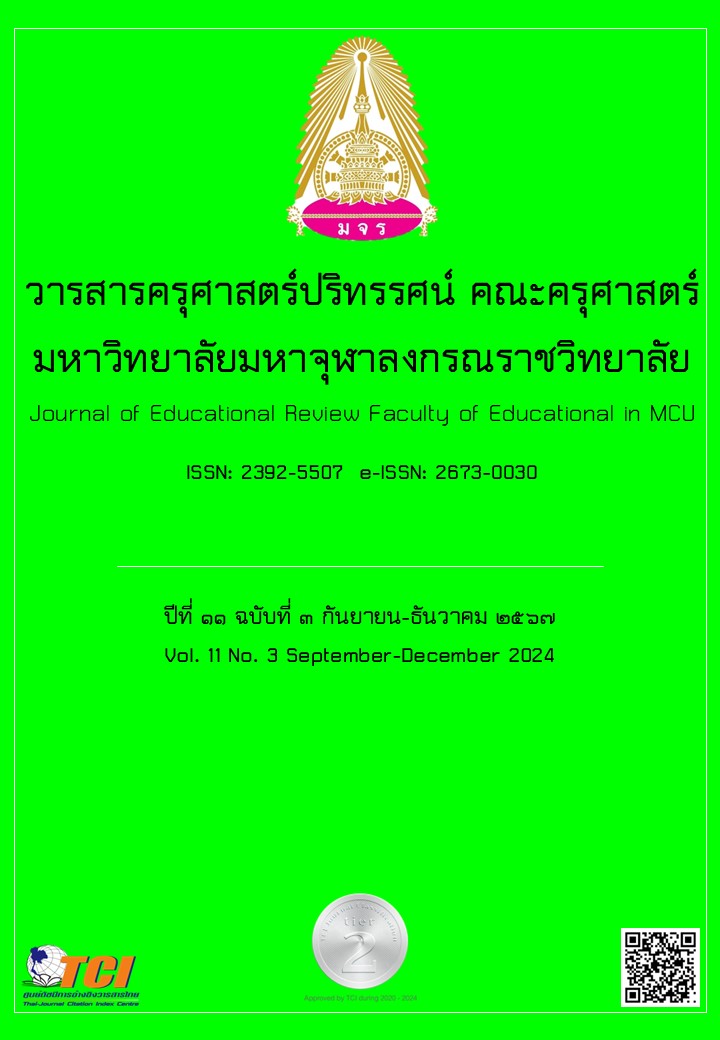THE GUIDELINE FOR EDUCATIONAL INSTITUTION MANAGEMENT ACCORDING TO BUDDHIST SCHOOL OF THE ENCOURAGE EFFICIENCY NETWORK GROUP OF SPECIAL EDUCATIONAL AREA 6
Main Article Content
Abstract
This research aims to 1) study the administration conditions of the schools in the network group promoting efficiency in special education management, 2) study the development methods of school administration according to the principles of Buddhist schools, and 3) propose guidelines for school administration according to the principles of Buddhist schools. This research is a mixed-methods study. The quantitative research used a questionnaire of the entire population of 272 administrators and teachers. The data were analyzed using statistics, including mean and standard deviation, and the qualitative research used interviews with 6 key informants. The data were analyzed using content analysis. The research results found that 1) The overall administration conditions of schools in the network group promoting efficiency in special education management in Educational Service Area 6 were at a high level. When considering each aspect, the opinions were at a high level in all 4 aspects: general administration and environmental administration, budget administration, personnel administration, and academic administration, respectively. 2) The administration methods of schools according to the principles of Buddhist schools consisted of (1) Academic administration: the school organized local communities to participate in activities to enhance and raise awareness among personnel in the school of the importance of self-development to have knowledge, understanding, and skills in producing and using media technology. (2) Personnel administration: Recruitment and appointment of personnel who were experts in each area. (3) Budget management, monitoring and following up on the work of personnel in the budget management group to comply with government regulations, policies and educational quality standards of the educational institution. (4) General administration and environmental management, creating an environment conducive to learning, with appropriate buildings and locations, providing the use of learning resources within the educational institution, and 3) Guidelines for the development of educational institution administration according to the principles of Buddhist schools, consisting of (1) Physical aspect, promoting learners to be able to eat, live, watch and listen. (2) Physical aspect, developing learning management within the educational institution close to nature, supporting and facilitating appropriately with special needs. (3) Basic lifestyle activities, organizing weekly daily lifestyle activities, determining learning content, learning units that integrated learning, focusing on learners, teaching and learning that were conducive. (4) Teaching and learning management, determining desirable characteristics, applying knowledge in daily life, creating a learning atmosphere of respect, smiling, being kind and compassionate to each other, having moral signs to promote the creation of an atmosphere in teaching and learning. (5) Atmosphere and interaction, promoting coordination with all sectors that interacted in the network, promoting the efficiency of special education management, creating an atmosphere for organizing Buddhist activities, promoting mental development and peace in daily life. (6) Management aspect, having transparency, creating a problem-solving and tracking system that provided opportunities for everyone to participate and supports the development of sustainable life skills and learning in students and staff, setting clear goals that were consistent with the vision and mission of Buddhist schools.
Article Details

This work is licensed under a Creative Commons Attribution-NonCommercial-NoDerivatives 4.0 International License.
ทัศนะและความคิดเห็นที่ปรากฏในบทความในวารสารฉบับนี้ถือเป็นความรับผิดชอบของผู้เขียนบทความนั้นเพียงผู้เดียว และไม่ถือเป็นทัศนะและความรับผิดชอบของกองบรรณาธิการ
กองบรรณาธิการขอสงวนสิทธิ์ในการคัดเลือกบทความลงตีพิมพ์และจะแจ้งให้เจ้าของบทความทราบหลังจากผู้ประเมินบทความตรวจอ่านบทความแล้ว
ต้นฉบับที่ได้รับการตีพิมพ์ในวารสารครุศาสตร์ปริทรรศน์ คณะครุศาสตร์ มหาวิทยาลัยมหาจุฬาลงกรณราชวิทยาลัย ถือเป็นกรรมสิทธิ์ของคณะครุศาสตร์ มหาวิทยาลัยมหาจุฬาลงกรณราชวิทยาลัย ห้ามนำข้อความทั้งหมดหรือบางส่วนไปพิมพ์ซ้ำ เว้นเสียแต่ว่าจะได้รับอนุญาตจากมหาวิทยาลัยฯ เป็นลายลักษณ์อักษร
References
กรมสามัญศึกษา. (2532). การจัดบรรยากาศและสิ่งแวดล้อมที่ดีในโรงเรียน. กรุงเทพมหานคร: กรมสามัญศึกษา.
กระทรวงศึกษาธิการ. (2542). พระราชบัญญัติการศึกษาแห่งชาติ พ.ศ. 2542. กรุงเทพมหานคร: โรงพิมพ์คุรุสภา.
ศิริพร พงศ์ศรีโรจน์. (2545). องค์การและการจัดการ. กรุงเทพมหานคร: โรงพิมพ์เทคนิค.
สำนักงานคณะกรรมการการศึกษาแห่งชาติ. (2545). พระราชบัญญัติการศึกษาแห่งชาติ พ.ศ. 2542 หมวดที่ 1 มาตรา 6 แก้ไขเพิ่มเติม (ฉบับที่ 2) พ.ศ. 2545 และ (ฉบับที่ 3) พ.ศ. 2553, กรุงเทพมหานคร: พริกหวานกราฟฟิค.
สำนักพัฒนานวัตกรรมการจัดการศึกษา กระทรวงศึกษาธิการ. (2566). โรงเรียนวิถีพุทธ. แหล่งที่มา http://www.vitheebuddha.com/main.php สืบค้นเมื่อ 10 มิ.ย. 2566.
สุรชาติ อินแผลง. (2550). การศึกษาสภาพการดำเนินงานโรงเรียนวิถีพุทธ สังกัดสำนักงานเขตพื้นที่การศึกษาเลย เขต 1: กรณีศึกษาโรงเรียนบ้านติ้วน้อย. วิทยานิพนธ์พุทธศาสตรมหาบัณฑิต.มหาวิทยาลัยขอนแก่น.
อรชร โพธิสุข และคณะ. (2545). เอกสารการสอนการบัญชีต้นทุนและการบัญชีเพื่อการจัดการ เรื่อง การวางแผนงานที่เกี่ยวข้องกับตัวเลขทางการเงิน. นนทบุรี: สำนักพิมพ์มหาวิทยาลัยสุโขทัยธรรมาธิราช.


